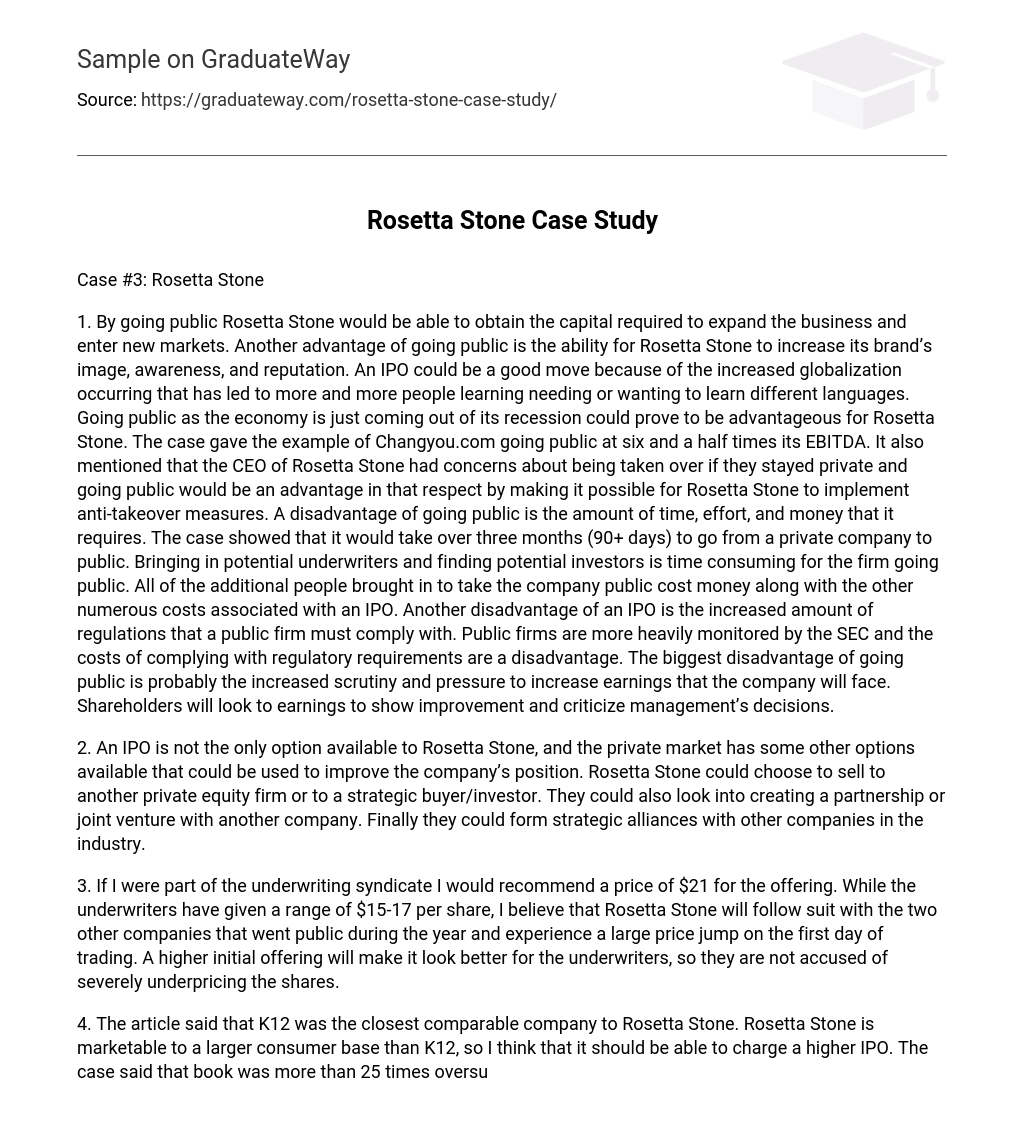By going public Rosetta Stone would be able to obtain the capital required to expand the business and enter new markets. Another advantage of going public is the ability for Rosetta Stone to increase its brand’s image, awareness, and reputation. An IPO could be a good move because of the increased globalization occurring that has led to more and more people learning needing or wanting to learn different languages. Going public as the economy is just coming out of its recession could prove to be advantageous for Rosetta Stone.
The case gave the example of Changyou.com going public at six and a half times its EBITDA. It also mentioned that the CEO of Rosetta Stone had concerns about being taken over if they stayed private and going public would be an advantage in that respect by making it possible for Rosetta Stone to implement anti-takeover measures. A disadvantage of going public is the amount of time, effort, and money that it requires. The case showed that it would take over three months (90+ days) to go from a private company to public.
Bringing in potential underwriters and finding potential investors is time consuming for the firm going public. All of the additional people brought in to take the company public cost money along with the other numerous costs associated with an IPO. Another disadvantage of an IPO is the increased amount of regulations that a public firm must comply with.
Public firms are more heavily monitored by the SEC and the costs of complying with regulatory requirements are a disadvantage. The biggest disadvantage of going public is probably the increased scrutiny and pressure to increase earnings that the company will face. Shareholders will look to earnings to show improvement and criticize management’s decisions.
An IPO is not the only option available to Rosetta Stone, and the private market has some other options available that could be used to improve the company’s position. Rosetta Stone could choose to sell to another private equity firm or to a strategic buyer/investor. They could also look into creating a partnership or joint venture with another company. Finally they could form strategic alliances with other companies in the industry.
If I were part of the underwriting syndicate I would recommend a price of $21 for the offering. While the underwriters have given a range of $15-17 per share, I believe that Rosetta Stone will follow suit with the two other companies that went public during the year and experience a large price jump on the first day of trading. A higher initial offering will make it look better for the underwriters, so they are not accused of severely underpricing the shares.
The article said that K12 was the closest comparable company to Rosetta Stone. Rosetta Stone is marketable to a larger consumer base than K12, so I think that it should be able to charge a higher IPO. The case said that book was more than 25 times oversubscribed during its road show which means Rosetta Stone could charge a much higher price. But these subscriptions are volatile and the economy is recovering, so a price too high could deter many investors.
For my analysis I took the EBITDA margin for years 2006-2008 and found the average increase during that time to be 9.93%. I then took the estimated share value from 2008 and multiplied it by 1.0993 to factor in the average increase in share value. This resulted in a price of $19.22. Given this number I would increase the current range from $15-17 to $19-24. The reason for the increased range is because of the expected success that I believe Rosetta Stone will have when it goes public.
Yes Mark should invest in the IPO. The IPO would give Rosetta Stone the capital to invest globally and reach a market that it is not fully utilizing. They would also be able to expand their business and most likely market share. Given the recent success of companies similar to Rosetta Stone, the industry looks positive for Rosetta Stone to experience success. This is significant due to the uncertain economic conditions at the time.
Mark should hold onto the stock if he believes that the stock will continue to experience growth, and that the IPO was underpriced. If the company is doing well and experiencing successes such as increased stock prices, market share, and globalization, then he should definitely hold onto the stock after the IPO.





